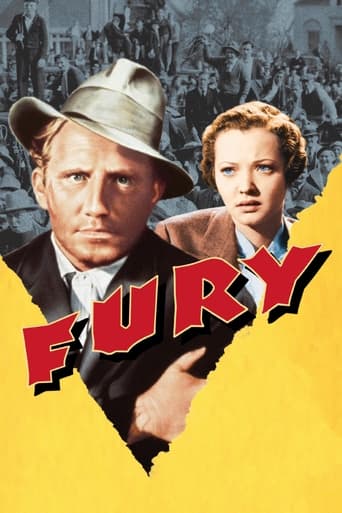grantss
Powerful examination of mob (in)justice.A man, Joe Wilson (played by Spencer Tracy), travels across state to meet his fiancé/girlfriend, Katherine (played by Sylvia Sidney). Along the way he is mistaken for a kidnapper, arrested and held in the local jail. The local townspeople, through gossip and stupidity, then take it upon themselves to punish him, burning down the jail, with him in it. However...The buildup to and execution of the lynching scene are brilliant. Famed director Fritz Lang builds the feeling of injustice and powerlessness on the part of the authorities and accused to do anything about it. By the time the scene occurs, the viewer's anger levels are sky-high. Very powerful storytelling by Lang.At this point the movie was a damning indictment on mob mentality. Politicians, shown pandering to the media and thinking about elections rather than the safety of their citizens, don't come off looking too good either. So far, so good - very true to life.However, the remainder of the movie, while still good, was not as convincing, focused or powerful. What follows feels a bit contrived, and even makes the victim into the villain. The ending was more about sentimentality than profundity and was a bit unsatisfying.Overall, a good movie, but could have been a masterpiece.
nomoons11
Words can't describe how powerful this film is. Spencer Tracy is so far above any actor today with this film alone that it's just sad....and this film was made over 75 years ago.A guy sends his future bride off to her parents so he can earn enough money so they can get married and start a life together. After he get's the money, he heads off to his bride but is derailed in a small town where they think he's a kidnapper in a recent case. He had salted peanuts in his pocket along with 1 $5 bill that was from the bank so they jail him and await the D.A. to question him. It never gets to that point. An angry mob, spurred on by a local punk trouble maker, decides to take law into their own hands. They attack the jail, beat the sheriff and his deputies, set it on fire and blow it up with dynamite. A trial ensues to try the 22 main members of the mob for murder. Problem is...he's not dead. He survived. After this you'll get drama and rage you can't believe. You'll wanna reach into the TV and punch all the liars of this supposed god fearing town.These types of films were made to make people think...not entertain. You won't be entertained by this film in any way, you'll be enraged. Like all mob mentality you get stupid, moronic, trouble-making idiots who don't see Justice the way this country intended it to be. Mob mentality rarely ever gets anything accomplished except in the short term. These townspeople use mob justice to condemn this guy who did nothing at all. Watching this you might get an idea of what it was like from the late 1800's to the 1950's when lynching was prominent. It's sad to see these uneducated dimwits take law into their own hands and dish out the wrong kind of justice.The court room scenes are just dead poetic. Watching these townspeople squirm after they get caught lying is just a pleasure to see. The build up from this is very tense right up until the end.What you'll come away with from this film is if you do exactly what others have done to you, you're no better than them.
Claudio Carvalho
The hard worker Joseph "Joe" Wilson (Spencer Tracy) and the teacher Katherine Grant (Sylvia Sidney) are in love with each other, but they do not have enough money to get married. Katherine gets a better job in Washington and together with Joe, they save money to get married one year later. Joe quits his job in the factory and uses his savings to buy a gas station, working with his brothers Charlie (Frank Albertson) and Tom (George Walcott). He makes enough money to get married with Katherine and buys a car. While driving with his dog Rainbow to meet his fiancée, Joe is stopped in Strand by the redneck Deputy "Bugs" Meyers (Walter Brennan) as suspect of kidnapping a boy in the Peabody Case. When they find peanuts in his pocket and a five-dollar bill in his pocket with the numeration of the money paid for ransom, Joe is arrested in jail for investigation."Bugs" Meyers makes a comment in the barbershop about the prisoner and sooner the gossip is spread in the little town. As a tale never loses in the telling, Joe is accused by the population of kidnapper and they try to invade the police station to lynch him. For political reason, Governor Burt (Howard Hickman) does not send the National Guard to help Sheriff Tad Hummel to protect Joe and the Police Station is burnt down by the vigilantes. Katherine witnesses the action and has a breakdown. Joe is presumed dead but out of the blue he appears at his brothers' apartment seeking justice. He had learnt that in accordance with the laws, Lynch Law is murder in the first degree and his brothers open a case against twenty-two dwellers of Strand. The prosecutor Mr. Adams accepts the case and Katherine Grant is the prime witness. Joe's revenge is set in motion. "Fury" tells the heartbreaking story of dehumanization of a good man and hard worker that believes in the justice and loves his country through the imprisonment and subsequent lynching by despicable people moved by gossip. Fritz Lang makes another excellent feature in his first American work, and I enjoyed the gossip sequence that ends in a brood of hens.The story is engaging with a great revenge of the bitter Joe. I would love to see the twenty-two defendants going to the gallows, but the moralist conclusion works perfectly in the story. My vote is eight.Title (Brazil): "Fúria" ("Fury")
jc-osms
...produces monsters. I remember this Fritz Lang classic from my youth and wondered if it could match up to my memories and capture me as it did those 30-40 years ago. I'm a huge fan of Lang's work, especially his unjustly overlooked, in my opinion, Hollywood movies, where he benefited from the advances in film technology, star actors and of course the relative freedom to make the films that he wanted without Nazi persecution.I've never marked a film "10" on IMDb before but cannot deny "Fury" this score. Like before, it just blew me way with the bravery and topicality of its subject matter (I've read up on the source-story of the Brooke Hart lynching in the US of only a few years previously), the imagination and verve of the cinematic devices that Lang employs to get his story across and last but not least some superb acting, most obviously from Spencer Tracy as the "ordinary Joe" (his name has to be deliberately chosen), but also from the greatly underrated Sylvia Sydney as his girl and in the nick of time, his redeeming conscience.The narrative is taut-tight, albeit with just a few humorous injections to keep the story on a human level. Lang wields his large cast with consummate ease, particularly the mob scene itself and the extensive courtroom scene which follows it. Tracy conveys his transformation from in-love happy-go-lucky journeyman Joe to hate-consumed avenging angel brilliantly with Sydney the calm to his storm who brings him back to reason just in time for the fates of the lynch mob on trial. The ensemble acting is great too, no character overplayed.There are so many memorable scenes to relate which demonstrate the maestro's sure touch - just a few amongst many - the juxtaposition of the rumour-mongering townsfolk with cackling hens, the use of close-ups particularly on Sydney's sad but honest face, the shot of a grizzled, hardened, transformed Tracy in the doorway before his grieving brothers are just some which come to mind but there are so many other Expressionist touches to savour.Some might argue the banality of Tracy's tell-tale giveaway which exposes the truth or the speed of the change of mood from dark to light right at the end, or even the plot similarities to his earlier, epochal "M" but I'll afford Lang all the cinematic licence he needed to put across this potent anti-lynching message (with obvious overtones of the Nazi thuggery then prevalent in his native Germany).For me then, this film is what great cinema is all about and as you can tell I just can't praise it highly enough.





